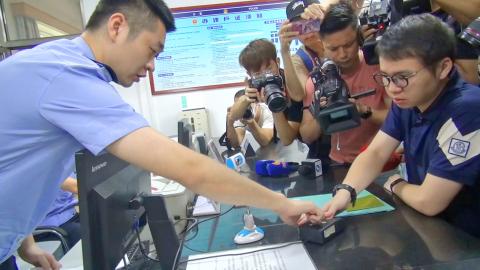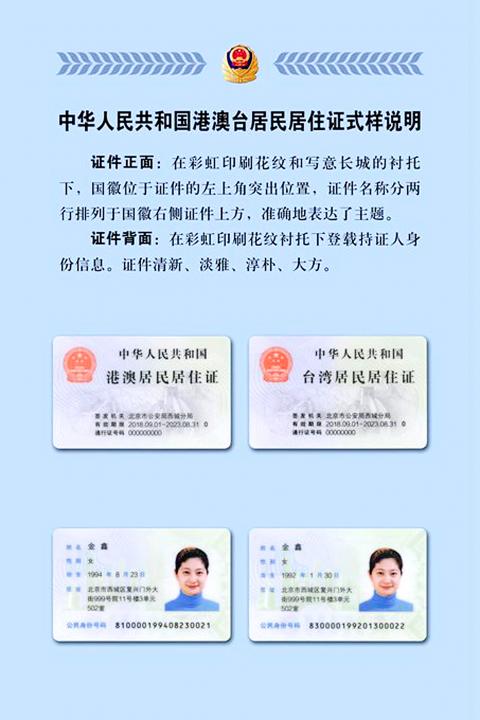Beijing’s issuing of residency permit cards for people from Taiwan, Hong Kong and Macau, which came into effect yesterday, is part of a ploy to bring Taiwan into China’s political fold, the Mainland Affairs Council said.
The cards, which carry an 18-digit code, look almost identical to Chinese identification cards and are aimed at belittling Taiwan’s sovereignty, the council said.
While Beijing has claimed that the new cards will provide Taiwanese residents in China with better access to public services, the council said that it is part of Beijing’s “united front” strategy, and would only benefit China’s agenda.

Photo: CNA
China is being irresponsible, because it has ignored public concerns over the risks card applicants might face, the council said, calling on Beijing to withdraw its “political ploy” and instead contribute to peaceful development across the Taiwan Strait.
The council has warned Taiwanese against risks to personal privacy, particularly in light of Beijing’s efforts to create a vast network of surveillance cameras and facial recognition systems as a means of social control.
The council said that it will try to find out more about the differences between the new cards, and the temporary residence cards issued to Taiwanese working and living in China.

Photo: CNA
Electronic terminals at railway stations, airports, banks and other places will be able to read the cards, making life easier for cardholders who are studying and working in China, the Chinese State Council has said.
Taiwanese do not need to have household registration in China to apply for the new card, but should have resided in China for more than six months, and must have a stable job and a place of residence.
Taiwan Democracy Watch yesterday in a statement said that by differentiating between household registrations and places of residence, Beijing is attempting to circumvent Article 9-1 of the Act Governing Relations Between the People of the Taiwan Area and the Mainland Area (臺灣地區與大陸地區人民關係條例 ), which stipulates: “The people of the Taiwan Area may not have household registrations in the Mainland Area or hold passports issued by the Mainland Area.”
Beijing would gradually force international organizations, and foreign governments and businesses to require Taiwanese to present the new cards on different occasions, forcing Taiwanese to call themselves People’s Republic of China citizens, and thereby claim jurisdiction over Taiwanese, the group said.
The government should restrict or revoke the civic rights of those who apply for the new cards, treat them as dual citizens or enact a separate law to regulate their status, it added.

Tropical Storm Gaemi strengthened into a typhoon at 2pm yesterday, and could make landfall in Yilan County tomorrow, the Central Weather Administration (CWA) said yesterday. The agency was scheduled to issue a sea warning at 11:30pm yesterday, and could issue a land warning later today. Gaemi was moving north-northwest at 4kph, carrying maximum sustained winds near its center of up to 118.8kph and gusts of 154.8kph. The circumference is forecast to reach eastern Taiwan tomorrow morning, with the center making landfall in Yilan County later that night before departing from the north coast, CWA weather forecaster Kuan Shin-ping (官欣平) said yesterday. Uncertainty remains and

SEA WARNING LIKELY: The storm, named Gaemi, could become a moderate typhoon on Wednesday or Thursday, with the Taipei City Government preparing for flooding A tropical depression east of the Philippines developed into a tropical storm named Gaemi at 2pm yesterday, and was moving toward eastern Taiwan, the Central Weather Administration (CWA) said. Gaemi could begin to affect Taiwan proper on Tuesday, lasting until Friday, and could develop into a moderate typhoon on Wednesday or Thursday, it said. A sea warning for Gaemi could be issued as early as Tuesday morning, it added. Gaemi, the third tropical storm in the Pacific Ocean this typhoon season, is projected to begin moving northwest today, and be closest to Taiwan on Wednesday or Thursday, the agency said. Today, there would likely

DISRUPTIONS: The high-speed rail is to operate as normal, while several airlines either canceled flights or announced early departures or late arrivals Schools and offices in 15 cities and counties are to be closed today due to Typhoon Gaemi, local governments announced last night. The 15 are: Taipei, New Taipei City, Taoyuan, Tainan, Keelung, Hsinchu and Kaohsiung, as well as Yilan, Hualien, Hsinchu, Miaoli, Chiayi, Pingtung, Penghu and Lienchiang counties. People should brace for torrential rainfall brought by the storm, with its center forecast to make landfall on the east coast between tonight and tomorrow morning, the Central Weather Administration (CWA) said. The agency issued a sea warning for the typhoon at 11:30pm on Monday, followed by a land warning at 11:30am yesterday. As of

CASUALTY: A 70-year-old woman was killed by a falling tree in Kaohsiung as the premier warned all government agencies to remain on high alert for the next 24 hours Schools and offices nationwide are to be closed for a second day today as Typhoon Gaemi crosses over the nation, bringing torrential rain and whipping winds. Gaemi was forecast to make landfall late last night. From Tuesday night, its outer band brought substantial rainfall and strong winds to the nation. As of 6:15pm last night, the typhoon’s center was 20km southeast of Hualien County, Central Weather Administration (CWA) data showed. It was moving at 19kph and had a radius of 250km. As of 3pm yesterday, one woman had died, while 58 people were injured, the Central Emergency Operation Center said. The 70-year-old